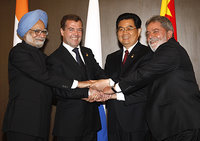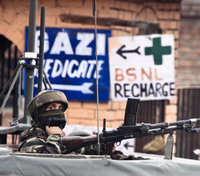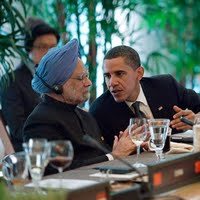Russia and India recently announced that they are cooperating on developing joint liquefied natural gas projects. In an email interview, Jörg Himmelreich, a senior fellow at the German Marshall Fund of the United States, discussed energy relations between Russia and India. WPR: Historically, what has been the energy relationship between Russia and India? Jörg Himmelreich: India and Russia have a formal strategic partnership dating back to the Cold War, when they were each other’s single most important partner. Even after the demise of the Soviet Union, they enjoyed traditionally good relations, although the resulting fundamental shift in the global order […]
India Archive
Free Newsletter
India and the European Union have reportedly hit a snag in their long-running negotiations over a free trade agreement, hoped to boost bilateral trade by nearly $30 billion. Initially slated for signature in early April, the agreement now appears to have been postponed until 2012. One of the key sticking points in the negotiations is a proposal to enhance intellectual property protections for medicine. India has a thriving generic drug industry. It did not allow patents on pharmaceutical products until 2005, when it adapted its laws to conform with the World Trade Organization’s intellectual property rules. Products produced prior to […]

The U.S.-led intervention in Libya is now in full swing, thanks to a 10-0 vote by the U.N. Security Council in favor of authorizing military force. But the seeming unanimity of the vote belies key abstentions from a wary Germany as well as Brazil, Russia, India and China — the four emerging economic powers known as the BRICs. The BRICs’ abstentions raise difficult questions about the future of a rules-based international order at a time of relative U.S. decline. The BRICs’ move seemed to be grounded in their longtime allergy to Western-led military operations. Couched in language of humanitarian concern, […]
India and Taiwan recently began the process of considering a free trade agreement. In an email interview, Mukul G. Asher, discussed India-Taiwan economic relations. WPR: What is the extent of Taiwan-India trade relations? Mukul G. Asher: In 2010, the bilateral merchandise trade between India and Taiwan was valued at $6.5 billion, making India Taiwan’s 16th-ranked global trade partner and accounting for only 1.2 percent of Taiwan’s and 1.6 percent of India’s global trade. The balance of trade is in Taiwan’s favor by $800 million. Data for trade in services are not published on a bilateral basis. WPR: What is driving […]

NEW DELHI — In India’s vibrant capital, food seems to be everywhere — from bustling fruit and vegetable markets and greasy kebab stalls, to sumptuous platters in rooftop restaurants and dilli ki chaat, Delhi’s ubiquitous street snacks. Poor street vendors and high-end chefs alike offer a multitude of culinary options to keep the city — and its array of visiting tourists, diplomats and business leaders — well-fed. Yet behind this apparent culinary prosperity lies rampant food insecurity. Food-related inflation in India soared above 18 percent in December, sparking street protests over high onion prices. Today, food-related inflation remains high, at […]
A number of attempts to create alternatives to the U.S. Global Positioning System are underway. Russia is close to completing its GLONASS system, which India plans to join, while China is working on developing its own system. In an email interview, Charles Vick, senior technical and policy analyst for GlobalSecurity.org, discussed global satellite navigation systems. WPR: What countries are currently pursuing a global navigation satellite system (GNSS) capability and what is the status of their programs? Charles Vick: The Global Positioning System (GPS), the global navigation system developed by the U.S., remains the primary system used by both the military […]
Brazil and India recently signed an agreement to improve air travel between the two countries, the latest small step in a broad bilateral relationship. In an email interview, Oliver Stuenkel, a fellow at the Global Public Policy Institute in Berlin, discussed Brazil-India relations. WPR: What is the state of trade between Brazil and India, including areas of complementarity and competition? Oliver Stuenkel: Trade between Brazil and India has grown significantly since the end of the Cold War, from $400 million in 1999, to $2 billion in 2005, passing $7 billion in 2010. A trade agreement between Mercosur — a regional […]

There is no popular or expert consensus about which actors possess economic power in the 21st century. Public uncertainty is reflected in the April 2010 Pew Global Attitudes survey, which reveals interesting cross-country discontinuities in the perception of power. When asked to identify “the world’s leading economic power,” a majority of respondents in a diverse array of developing countries — including Brazil and India — name the United States. On the other hand, in the developed world, the results look dramatically different, with strong pluralities in five of the original G-7 economies — including the United States, Japan and Germany […]

India has vehemently opposed the imposition of a no-fly zone in strife-torn Libya. Though New Delhi supported U.N. Security Council Resolution 1970, authorizing ecomonic sanctions against Col. Moammar Gadhafi and referring Libya to the International Criminal Court, India has made it clear that it stands against any kind of military intervention in the troubled state. However, New Delhi’s aversion to intervention is far from consistent: When it comes to South Asia, in particular, intervention in the internal matters of other states has long been part and parcel of India’s foreign policy. In 1971, India fought a war with Pakistan and […]

With Indian newspapers still carrying obituaries of the country’s strategic doyen, K. Subhramanyam, who passed away in February after almost a half-century at the forefront of New Delhi’s strategic debates, it is worth considering the object of Subhramanyam’s concern during his final days: the implications for India of a proposed U.S.-China grand strategy agreement hammered out by a group of policy experts in Washington and Beijing. The document proposed a series of strategic compromises between China and the U.S., including a massive Chinese investment in the U.S. economy in return for an informal nonaggression pact, particularly with regard to the […]
